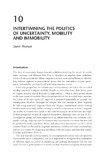| dc.contributor.author | Thorsen, Dorte | |
| dc.date.accessioned | 2020-12-04T12:52:29Z | |
| dc.date.available | 2020-12-04T12:52:29Z | |
| dc.date.issued | 2020 | |
| dc.identifier.citation | Thorsen, D. (2020) ‘Intertwining the Politics of Uncertainty, Mobility and Immobility’, in I. Scoones and A. Stirling (eds) (2020) The Politics of Uncertainty: Challenges of Transformation, pp 141-150, (1st ed.), Routledge | en |
| dc.identifier.uri | https://opendocs.ids.ac.uk/opendocs/handle/20.500.12413/15825 | |
| dc.description.abstract | This chapter explores how politics of uncertainty shape mobilities and immobilities. Recognising that institutions of different types are central in producing and resisting uncertainty, the chapter unpicks how formal and informal institutions in different geographical spaces set the parameters for societal hope and how it is distributed. By juxtaposing the dominant state-driven rhetoric surrounding migration with the common perception among an increasing section of the African public that the potential for a decent life lies outside their country, a mobility paradox manifests. Cross-border mobilities have become increasingly premised on hope, wherein hope is a horizon of imaginable potentiality amid uncertainty about whether the hoped-for future can be reached. Hage’s conceptualisation of societal hope highlights that what constitutes imaginable potentiality is distributed unequally. Institutions like the state, society or a transnational network provide a mechanism for evaluating who belongs to the distributional network, in which way and to what degree. Drawing on empirical evidence produced by a group of researchers in long-term and deep engagements with the field, the chapter exposes the competing forces of the formal and informal institutions. The formal politics of migration management aimed at constricting migrants’ societal hope clash with the production of societal hope in the informal institutions enveloping migrants’ life-worlds. The chapter unveils that risks and uncertainties encountered as migrants are highly gendered. Although migrants are afforded little societal hope where they live and work as migrants, mobilities can have transformative potential at home, especially where gender relations within families gradually change towards greater equality. | en |
| dc.language.iso | en | en |
| dc.publisher | Routledge | en |
| dc.rights.uri | http://creativecommons.org/licenses/by-nc-nd/4.0/ | en |
| dc.subject | Politics and Power | en |
| dc.subject | Social Protection | en |
| dc.title | Intertwining the Politics of Uncertainty, Mobility and Immobility | en |
| dc.type | Book chapter | en |
| dc.rights.holder | © 2020 selection and editorial matter, Ian Scoones and Andy Stirling; individual chapters, the contributors | en |
| dc.identifier.externaluri | https://www.taylorfrancis.com/books/e/9781003023845/chapters/10.4324/9781003023845-10 | en |
| dc.identifier.team | Resource Politics | en |
| dc.identifier.doi | 10.4324/9781003023845 | |
| rioxxterms.funder | Default funder | en |
| rioxxterms.identifier.project | Default project | en |
| rioxxterms.version | VoR | en |
| rioxxterms.funder.project | 9ce4e4dc-26e9-4d78-96e9-15e4dcac0642 | en |


